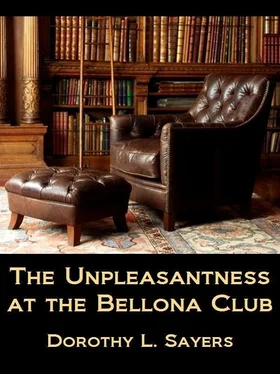“Did Fentiman go to the customer’s house?”
“Not he. Disappeared completely. We shall find the car, of course — it’s only a matter of time.”
“Yes,” said Wimsey. His voice sounded tired and constrained.
“This alters the look of things a bit,” said Parker, “doesn’t it?”
“Yes.”
“What have you done to your face, old man?”
Wimsey glanced at the looking-glass, and saw that an angry red flush had come up on the cheekbone.
“Had a bit of a dust-up with Robert,” he said.
“Oh!”
Parker was aware of a thin veil of hostility, drawn between himself and the friend he valued. He knew that for the first time, Wimsey was seeing him as the police. Wimsey was ashamed and his shame made Parker ashamed too.
“You’d better have some breakfast ” said Parker. His voice sounded awkward to himself.
“No — no thanks, old man. I’ll go home and get a bath and shave.”
“Oh, right-oh!”
There was a pause.
“Well, I’d better be going,” said Wimsey.
“Oh, yes,” said Parker again. “Right-oh!”
“Er — cheerio!” said Wimsey at the door.
“Cheerio!” said Parker.
The bedroom door shut. The flat-door shut. The front-door shut.
Parker pulled the telephone towards him and called up Scotland Yard.
*****
The atmosphere of his own office was bracing to Parker when he got down there. For one thing, he was taken aside by a friend and congratulated in conspiratorial whispers.
“Your promotion’s gone through,” said the friend. “Dead certainty. The Chief’s no end pleased. Between you and me, of course. But you’ve got your Chief-Inspectorship all right. Damn good.”
Then, at ten o’clock, the news came through that the missing Walmisley-Hubbard had turned up. It had been abandoned in a remote Hertfordshire lane. It was in perfectly good order, the gear-lever in neutral and the tank full of petrol. Evidently, Fentiman had left it and wandered away somewhere, but he could not be far off. Parker made the necessary arrangements for combing out the neighbourhood. The bustle and occupation soothed his mind. Guilty or insane or both, George Fentiman had to be found; it was just a job to be done.
The man who had been sent to interview Mrs. Munns (armed this time with a warrant) returned with the fragments of the bottle and tablets. Parker duly passed these along to the police analyst. One of the detectives who was shadowing Miss Dorland rang up to announce that a young woman had come to see her, and that the two had then come out carrying a suit-case and driven away in a taxi. Maddison, the other detective, was following them. Parker said, “All right; stay where you are for the present,” and considered this new development. The telephone rang again. He thought it would be Maddison, but it was Wimsey — a determinedly brisk and cheerful Wimsey this time.
“I say, Charles. I want something.”
“What?”
“I want to go and see Miss Dorland.”
“You can’t. She’s gone off somewhere. My man hasn’t reported yet.”
“Oh! Well, never mind her. What I really want to see is her studio.”
“Yes? Well, there’s no reason why you shouldn’t.”
“Will they let me in?”
“Probably not. I’ll meet you there and take you in with me. I was going out any way. I’ve got to interview the nurse. We’ve just got hold of her.”
“Thanks awfully. Sure you can spare the time?”
“Yes. I’d like your opinion.”
“I’m glad somebody wants it. I’m beginning to feel like a pelican in the wilderness.”
“Rot! I’ll be round in ten minutes.”
“Of course,” explained Parker, as he ushered Wimsey into the studio, “we’ve taken away all the chemicals and things. There’s not much to look at, really.”
“Well, you can deal best with all that. It’s the books and paintings I want to look at. H’m! Books, you know, Charles, are like lobster-shells. We surround ourselves, with ’em, and then we grow out of ’em and leave ’em behind, as evidences of our earlier stages of development.”
“That’s a fact,” said Parker. “I’ve got rows of school-boy stuff at home — never touch it now, of course. And W. J. Locke — read everything he wrote once upon a time. And Le Queux, and Conan Doyle, and all that stuff.”
“And now you read theology. And what else?”
“Well, I read Hardy a good bit. And when I’m not too tired, I have a go at Henry James.”
“The refined self-examinations of the infinitely-sophisticated. ’M-m. Well now. Let’s start with the shelves by the fireplace. Dorothy Richardson — Virginia Woolf — E. B. C. Jones — May Sinclair — Katherine Mansfield — the modern female writers are well represented, aren’t they? Galsworthy. Yes. No J. D. Beresford — no Wells — no Bennett. Dear me, quite a row of D. H. Lawrence. I wonder if she reads him very often.”
He pulled down “Women in Love” at random, and slapped the pages open and shut.
“Not kept very well dusted, are they? But they have been read. Compton Mackenzie — Storm Jameson — yes — I see.”
“The medical stuff is over here.”
“Oh! — a few text-books — first steps in chemistry. What’s that tumbled down at the back of the book-case? Louis Berman, eh? The Personal Equation. And here’s Why We Behave Like Human Beings. And Julian Huxley’s essays. A determined effort at self-education here, what?”
“Girls seem to go in for that sort of thing nowadays.”
“Yes — hardly nice, is it? Hallo!”
“What?”
“Over here by the couch. This represents the latest of our lobster-shells, I fancy. Austin Freeman, Austin Freeman, Austin Freeman — bless me! she must have ordered him in wholesale. Through the Wall —that’s a good ’tec story, Charles — all about the third degree — Isabel Ostrander — three Edgar Wallaces — the girl’s been indulging in an orgy of crime!”
“I shouldn’t wonder,” said Parker, with emphasis. “That fellow Freeman is full of plots about poisonings and wills and survivorship, isn’t he?”
“Yes”—Wimsey balanced A Silent Witness gently in his hand, and laid it down again. “This one, for instance, is all about a bloke who murdered somebody and kept him in cold storage till he was ready to dispose of him. It would suit Robert Fentiman.”
Parker grinned.
“A bit elaborate for the ordinary criminal. But I daresay people do get ideas out of these books. Like to look at the pictures? They’re pretty awful.”
“Don’t try to break it gently. Show us the worst at once… Oh, lord!”
“Well, it gives me a pain,” said Parker. “But I thought perhaps that was my lack of artistic education.”
“It was your natural good taste. What vile colour, and viler drawing.”
“But nobody cares about drawing nowadays, do they?”
“Ah! but there’s a difference between the man who can draw and won’t draw, and the man who can’t draw at all. Go on. Let’s see the rest.”
Parker produced them, one after the other. Wimsey glanced quickly at each. He had picked up the brush and palette and was fingering them as he talked.
“These,” he said, “are the paintings of a completely untalented person, who is moreover, trying to copy the mannerisms of a very advanced school. By the way, you have noticed, of course, that she has been painting within the last few days, but chucked it in sudden disgust. She has left the paints on the palette, and the brushes are still stuck in the turps, turning their ends up and generally ruining themselves. Suggestive, I fancy. The — stop a minute! Let’s look at that again.”
Parker had brought forward the head of the sallow, squinting man which he had mentioned to Wimsey before.
Читать дальше












